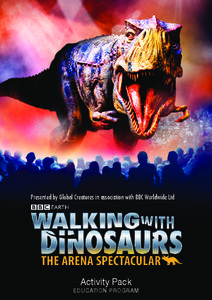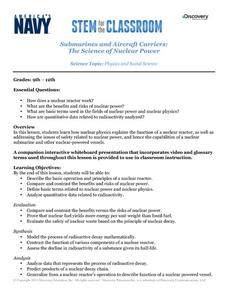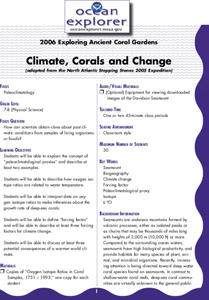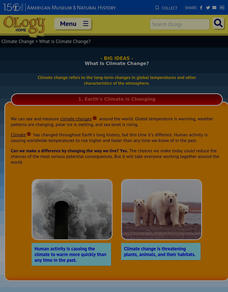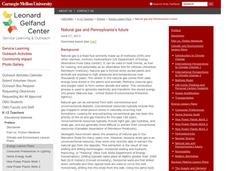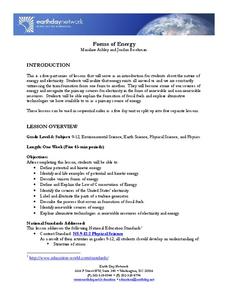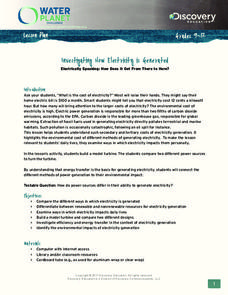BBC
Walking with Dinosaurs
Breath new life into your class's study of dinosaurs with this extensive collection of materials. Offering everything from a printable T-rex mask, word searches, and connect-the-dots activities to informational handouts, hands-on...
It's About Time
Mass Extinction and Fossil Records
The focus of a fossil-based lesson uses graphs and charts that allow young paleontologists to make inferences about events of mass extinction. They must apply their previous knowledge about fossil records in this final lesson of the...
Lerner Publishing
Meet the Dinosaurs
Take your class of youngsters on a prehistoric adventure with this four-lesson series on dinosaurs. Accompanying the Meet the Dinosaurs books by Don Lessem, these lessons engage children in writing their own dinosaur books, making...
Carnegie Mellon University
Transportation
Teach your environmental studies, life science, or engineering class how an internal combustion engine works using the first few slides of the accompanying presentation. Then, focus in on the resulting carbon emissions. Finally, take a...
Discovery Education
Submarines and Aircraft Carriers: The Science of Nuclear Power
As physics masters view this presentation, they learn how nuclear power is used in submarines. They use Google Maps to plot a course through the ocean and calculate the time required for surfacing and traveling. They learn about fission,...
American Museum of Natural History
What's the Big Deal About Paleontology?
Paleontologists could be considered detectives of the past. A quick online lesson describes the science of paleontology and the importance of fossils. Young scientists read about how paleontologists analyze the features of fossils to...
Howard Hughes Medical Institute
Deep History of Life on Earth
Take it all the way back! Young scientists discover the changes that took place from the time Earth became solid to present day through an interesting interactive. The resource guides users through key events that have shaped our world...
NOAA
Climate, Corals and Change
Global warming isn't just an issue on land; deep ocean waters are also showing troubling signs. Young scientists learn more about deep water corals and the many recent discoveries researchers have made. Then they examine data related to...
Columbus City Schools
Diversity of Living Things
Here's a topic classes can really dig—the fossil record. Use the well-organized and thoughtful road map to take eighth graders back in time to unearth the answer. Learn how our climate has changed, and how organisms have changed along...
American Museum of Natural History
Climate Change
It actually is possible to have too much of a good thing when it comes to climate change. A slide show lesson describes how burning fossil fuels contributes to climate change. Individuals read about the scientific process and the...
American Museum of Natural History
What Is Climate Change?
So many factors show that climate change has arrived. Learners read through an online resource that explains the data and the consequences of climate change. They also review strategies for slowing or even reversing the global influence.
Channel Islands Film
Island Rotation: Lesson Plan 3
How far have California's Channel islands moved? What was the rate of this movement? Class members first examine data that shows the age of the Hawaiian island chain and the average speed of the Pacific Plate. They then watch West of the...
American Museum of Natural History
A Whale of a Tale
What's the most interesting fact about a blue whale? Learners read an interview about the similarities between the Titanosaur and the blue whale displays at the American Museum of Natural History. Pupils learn not only about blue whales...
Channel Islands Film
Island Rotation: Lesson Plan 4
Foster's Rule? Allopatric speciation? After watching West of the West's documentary Island Rotation, class members use Venn diagrams to compare endemic species on the Channel Islands with mainland related species. They then create a...
Carnegie Mellon University
Natural Gas and Pennsylvania’s Future
Beginning with a general discussion about natural gas, methane, and hydrocarbons, a few videos and diagrams are projected to support the lecture. Individuals participate in a brief activity by drinking juice through a straw, and then...
Earth Day Network
Forms of Energy
Give me a home where electric buffalo roam and I'll show you an ohm on the range. Introduction your classes to potential and kinetic energy, electricity, and renewable resources with a resource that combines observation, direct...
EarthEcho International
Investigating How Electricity is Generated
What is the real cost of electricity? The real cost is not just the price you pay, but the environmental and economic costs as well. Scholars build, use, and judge the effectiveness of a turbine. They also investigate the environmental...
Global Oneness Project
Deconstructing Consumerism
To increase awareness and launch a discussion of consumerism, class members view What Would It Look Like, a 25 minute film of images that capture the global effects of the consumption of goods. Viewers make a list of the images that they...


